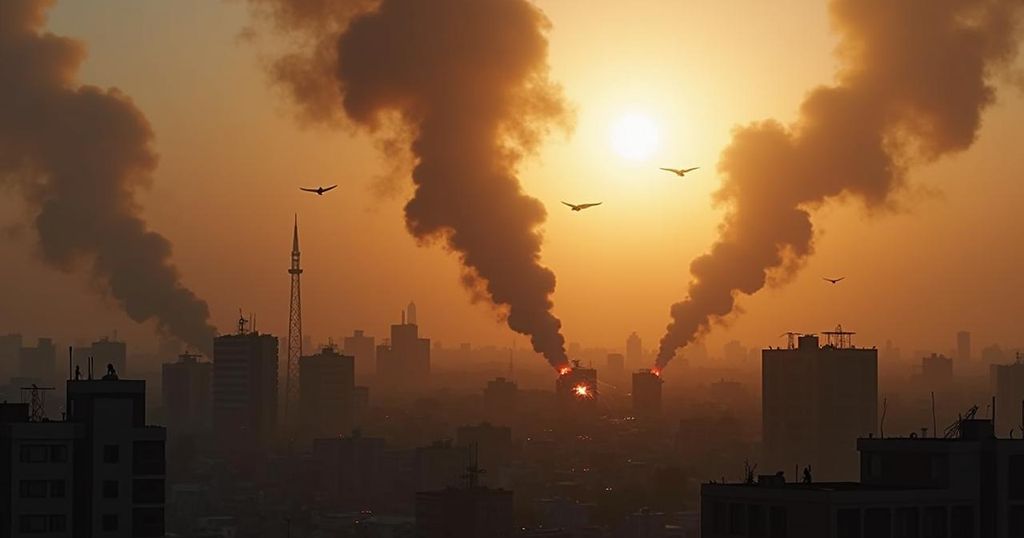Israeli air strikes on central Beirut have resulted in the deaths of at least six individuals, as part of a broader surge in violence across Lebanon that has claimed 46 lives in just 24 hours. UN Secretary-General Antonio Guterres has called for urgent de-escalation. Israel’s foreign minister declared the Secretary-General persona non grata after accusing him of bias. Explosions continue to be reported in Beirut, with fears of further conflict persisting.
An escalation in violence has tragically resulted in the deaths of at least six individuals during Israeli air strikes targeting the heart of Beirut. This distressing event occurred overnight, occurring as part of a broader offensive that has claimed approximately 46 lives across Lebanon within a span of 24 hours, as reported by the Lebanese Health Ministry. In response to the recent surge in hostilities, an emergency meeting of the United Nations Security Council convened where UN Secretary-General Antonio Guterres stressed the urgent need for de-escalation. The nearly three-hour discussion saw both Iran and Israel defend their actions, while Lebanon reiterated its call for the enforcement of the 2006 UN Security Council resolution, which advocates for a demilitarized buffer zone in southern Lebanon. Israel’s foreign minister further escalated tensions by declaring the Secretary-General persona non grata, effectively barring him from entering Israel and accusing him of partisan affiliation with Hezbollah, Hamas, and Iran. Although the Secretary-General did not respond publicly to this declaration, a spokesperson addressed the matter on his behalf. As the UN meeting concluded, members were left pondering the potential outcomes of Israel’s next actions. Within the Lebanese capital, Al Jazeera correspondent Laura Khan reported that the casualty count from the air strikes in central Beirut had risen to six, noting, “We know so far there have been six fatalities”. The violence had seen two individuals perish instantly while others succumbed to their injuries during medical treatment, with seven patients still receiving care in hospitals. The situation in the broader Middle East continues to escalate, with UN Secretary-General Guterres warning that the raging fires of conflict are swiftly transforming into an inferno. He cautioned that the situation is evolving from bad to “much, much worse” and urgently called for an end to the “deadly cycle” of violence. Amidst this turmoil, reports of explosions have persisted in Beirut, with the most significant blast occurring shortly after midnight in the Bashoura district. Information indicates that specific buildings were targeted in these recent strikes, raising fears of further violence. This marks the second significant attack on central Beirut in a year rife with hostilities between Hezbollah and Israel, raising grave concerns for civilian safety and regional stability. As Al Jazeera continues to provide live coverage of the ongoing situation, including strikes in Gaza and rising tensions involving Iran, the international community remains on high alert for further developments and potential escalation of conflict on this volatile front.
The recent air strikes in Beirut are part of a larger pattern of hostilities involving Israel and various entities within Lebanon, particularly Hezbollah, which has a significant military presence in the region. The conflict has intensified in recent weeks, resulting in rising casualties and a humanitarian crisis. The United Nations has repeatedly called for de-escalation and adherence to previous resolutions aimed at preventing violence and ensuring the rights of civilians in conflict zones. As tensions between Iran and Israel heighten, the ramifications of these strikes extend beyond Lebanon, suggesting potential implications for regional stability and security.
In conclusion, the tragic loss of life due to the recent Israeli air strikes in Beirut underscores the escalating violence within the region. The urgent calls for de-escalation by the UN reflect a dire need to halt the cycle of retaliation and violence that has wrought devastation across Lebanon. As the situation unfolds, the international community will likely remain vigilant, monitoring developments that could further destabilize an already fragile Middle East. The rhetoric and actions from regional powers can exacerbate tensions, making the quest for peace all the more critical.
Original Source: www.aljazeera.com







